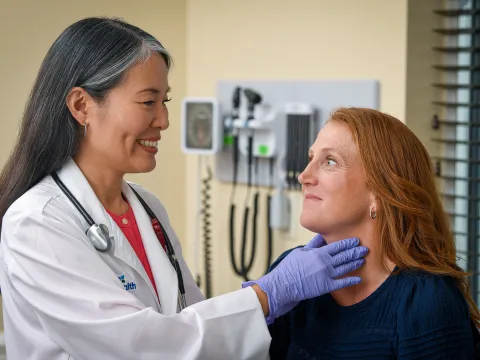- AdventHealth

Choose the health content that’s right for you, and get it delivered right in your inbox.
With how busy life can get, it’s understandably tough to justify adding a doctor’s appointment to your schedule when you’re not feeling ill. However, health screenings are an important part of your overall care and lasting well-being. And we’re sharing why it’s important to carve time out of your day and get your screenings on your calendar.
Routine health screenings are important because they protect you from health problems now and down the road by providing insight into your medical risk factors and potential complications.
Keep reading to discover how routine health screenings can save your health and — potentially — your life.
What Is a Health Screening?
Health screening services include different types of medical exams that aim to catch early signs of disease or health problems. Each test examines specific aspects of your health so your doctor gets an up-close look at what they’re testing for.
How to Get a Health Screening
Your doctor may order health screenings during your annual wellness visit. This important visit is meant to update your doctor on any new symptoms you may be experiencing, or changes in your health or lifestyle. For example, new symptoms like sudden weight loss, dizziness or consistent diarrhea may indicate underlying issues. If you’re experiencing new symptoms, inform your primary care provider during your visit and they may order additional testing.
Screenings in addition to your annual wellness exam aren’t always required, but if your primary care provider recommends any additional screenings, it’s always a good idea to schedule them so you can have the best picture of your health.
Why Are Health Screenings Important?
Health screenings are important because they can detect potential medical problems before you even notice any symptoms. This is important because some diseases, like cancers, don’t show any signs until they’ve progressed to more severe stages. In some cases, health screenings can truly make the difference between life and death.
Different Health Screenings and Why They Matter
Your primary care provider may perform or suggest additional health screenings based on your symptoms, examination results or medical history. These additional tests provide a deeper look into your health so your physician can decide whether a diagnosis, surgery or treatment is appropriate.
Here are a few health screenings that may or may not be a standard part of your annual physical:
Health Screenings by Age and Gender
Health screenings are tailored to your age and gender assigned at birth to address specific health risks and preventive measures. As you age, the frequency and types of screenings you need will change. These screenings help detect potential health issues early, allowing for timely treatment and better health outcomes.
Health Screenings for Women
Women’s health screenings monitor conditions like breast and cervical cancers, osteoporosis and reproductive health. Regular screenings — such as mammograms, Pap smears and bone density tests — are vital for early detection and prevention. These screenings help you maintain overall health and address gender- and age-specific health concerns.
Pap Smears (Cervical Health)
Pap smears are screenings for cervical cancer and precancerous changes in your cervix. The test involves collecting cells from the cervix and examining them for abnormalities. Regular Pap smears can detect cervical changes early, allowing for timely treatment and prevention of cervical cancer.
Health Screenings for Men
Men’s health screenings can detect conditions like prostate cancer, testicular cancer and heart disease. Regular screenings such as prostate exams, testicular exams and cholesterol tests are crucial for early detection and prevention. These screenings help you maintain overall health and address gender- and age-specific health concerns.
Prostate Exams
Prostate exams, including digital rectal exams (DRE) and prostate-specific antigen (PSA) tests, are crucial for detecting prostate cancer and other prostate-related issues. These screenings are recommended for men, especially those over 50 or with a family history of prostate cancer. Early detection through these exams increases your chances of successful treatment and management.
Testicular Exams
Testicular exams involve checking your testicles for lumps, changes in size and other abnormalities that could indicate testicular cancer. These exams are crucial for early detection, as testicular cancer is highly treatable when caught early. Regular self-exams and medical check-ups can lead to prompt diagnosis and treatment.
BMI Checks
Body mass index (BMI) checks are a useful way to assess whether you have a healthy body weight for your height. This measurement helps identify if you are underweight, overweight or obese, which are risk factors for various health conditions such as heart disease, diabetes and hypertension. Regular monitoring can aid in early intervention and promote lifestyle changes to maintain a healthy weight.
Bone Density Tests
Bone density tests, often conducted using DEXA scans, measure bone strength and density. They are crucial for diagnosing osteoporosis and assessing the risk of fractures, especially in postmenopausal women and older adults. Early detection through these tests can lead to preventive treatments that strengthen bones and reduce fracture risks.
Colonoscopies (Colon Health)
Colonoscopies are vital for detecting colorectal cancer and other abnormalities in your colon and rectum. This screening involves examining the inner lining of the large intestine using a flexible camera. Early detection through colonoscopies can lead to the removal of precancerous polyps and early-stage cancer, significantly improving treatment outcomes.
Eye Exams
Eye exams are crucial for maintaining your vision and detecting eye diseases like glaucoma, macular degeneration and diabetic retinopathy. These exams typically include visual acuity, eye pressure and retina health tests. Regular eye exams can prevent vision loss and help you manage existing eye conditions effectively.
Preventive MRIs
MRIs can detect potential health issues before symptoms arise, particularly in high-risk individuals. These scans can identify early signs of cancer, neurological conditions and cardiovascular diseases. Early detection through preventive MRIs can lead to proactive treatments and better health outcomes.
STI Testing
STI tests help determine whether you’re at risk of or have already contracted a sexually transmitted disease. These screenings are vital for early detection and treatment of STIs, preventing complications and reducing the spread of infections. Regular screening and honest responses are essential for effective sexual health management.
Stress Tests (Heart Health)
Stress tests evaluate how your heart functions under physical stress, typically through exercise or medication that simulates exercise. These tests are essential for diagnosing coronary artery disease, heart arrhythmias and other cardiovascular conditions. They help determine your heart's capacity to handle physical activity and guide treatment plans for heart health.
Importance of Preventative Health Care
Preventive health care aims to stop illness before it starts. Early intervention reduces the risk of hospitalization and the need for chronic disease management services or lengthy treatments.
Over time, you and your doctor will work together to assess your health and monitor any new symptoms or changes that occur. Certain diseases have better outcomes when detected early, and health screenings are your most reliable way to detect early signs of disease, including cancer, diabetes and high blood pressure. The sooner you and your doctor discover an illness or disease, the sooner you can get things under control.
Preventive care extends your lifespan and quality of life and reduces costs for both you and the health care system.
Benefits of Regular Health Screenings
While health screenings may seem exhausting at first, they can save time, money and resources in the long run.
Consider the advantages of getting regular health screenings:
- Avoid severe health complications
- Better quality of life
- Comprehensive health care plans and treatments
- Early intervention for progressive diseases
- Education on healthy lifestyle choices
- Identification of risk factors
- Longer lifespan
- More data for your doctor to evaluate
- More treatment options
- Peace of mind and reduced anxiety about your health
- Reduced medical costs (individual and collective)
Prioritizing your health screenings is your best route to a healthy future.
Prioritize Your Long-Term Health with AdventHealth Primary Care+
Attending yearly checkups and following through with any health screenings your doctor asks for can catch problems early. Developing a positive relationship with your doctor is the first step to long-term health and wellness. If you don’t have a primary care provider yet, now’s the perfect time to find one.
At AdventHealth Primary Care+, our wonderful team of primary care providers can help you maintain good health. Schedule an appointment to get started today.





